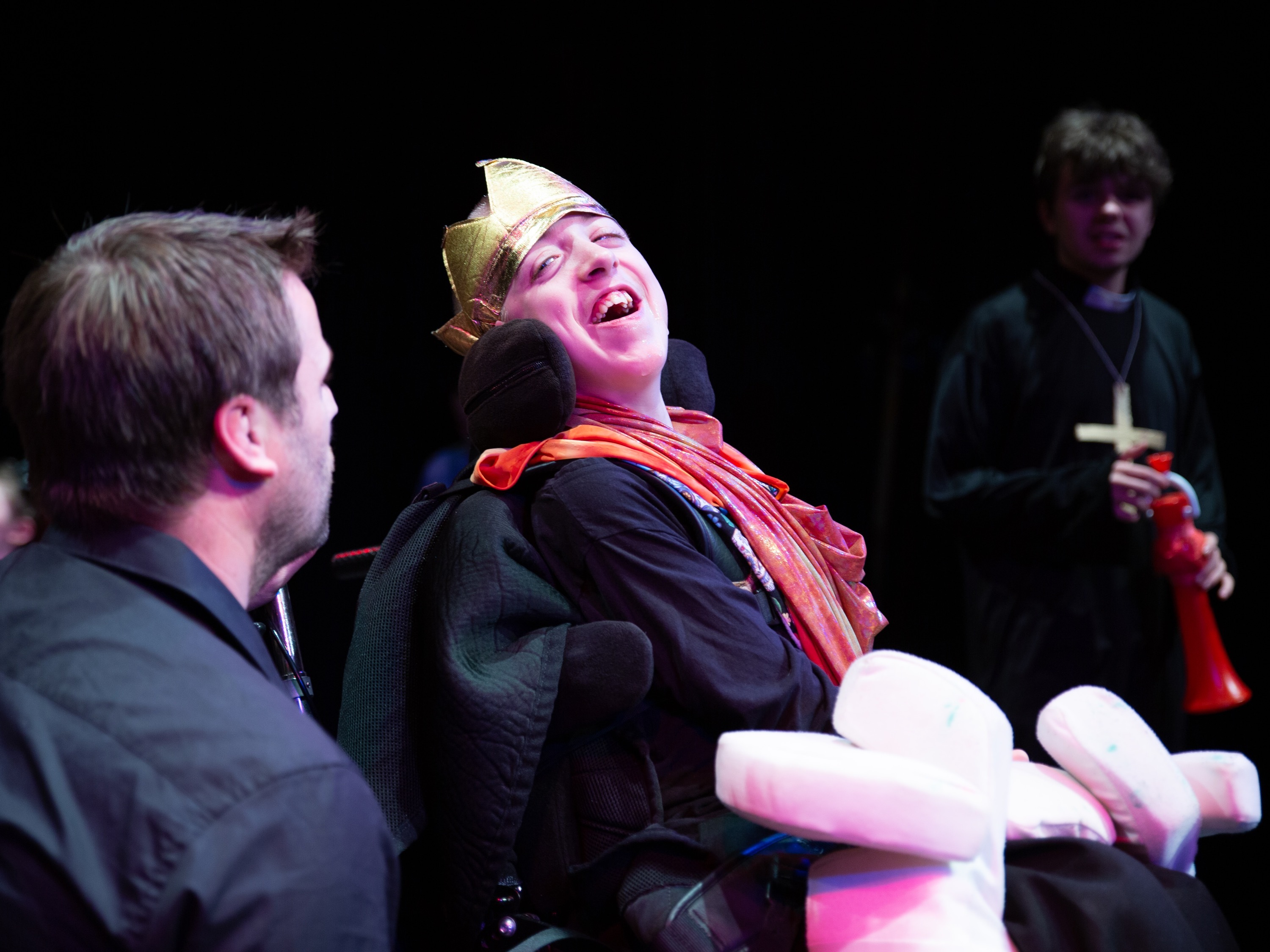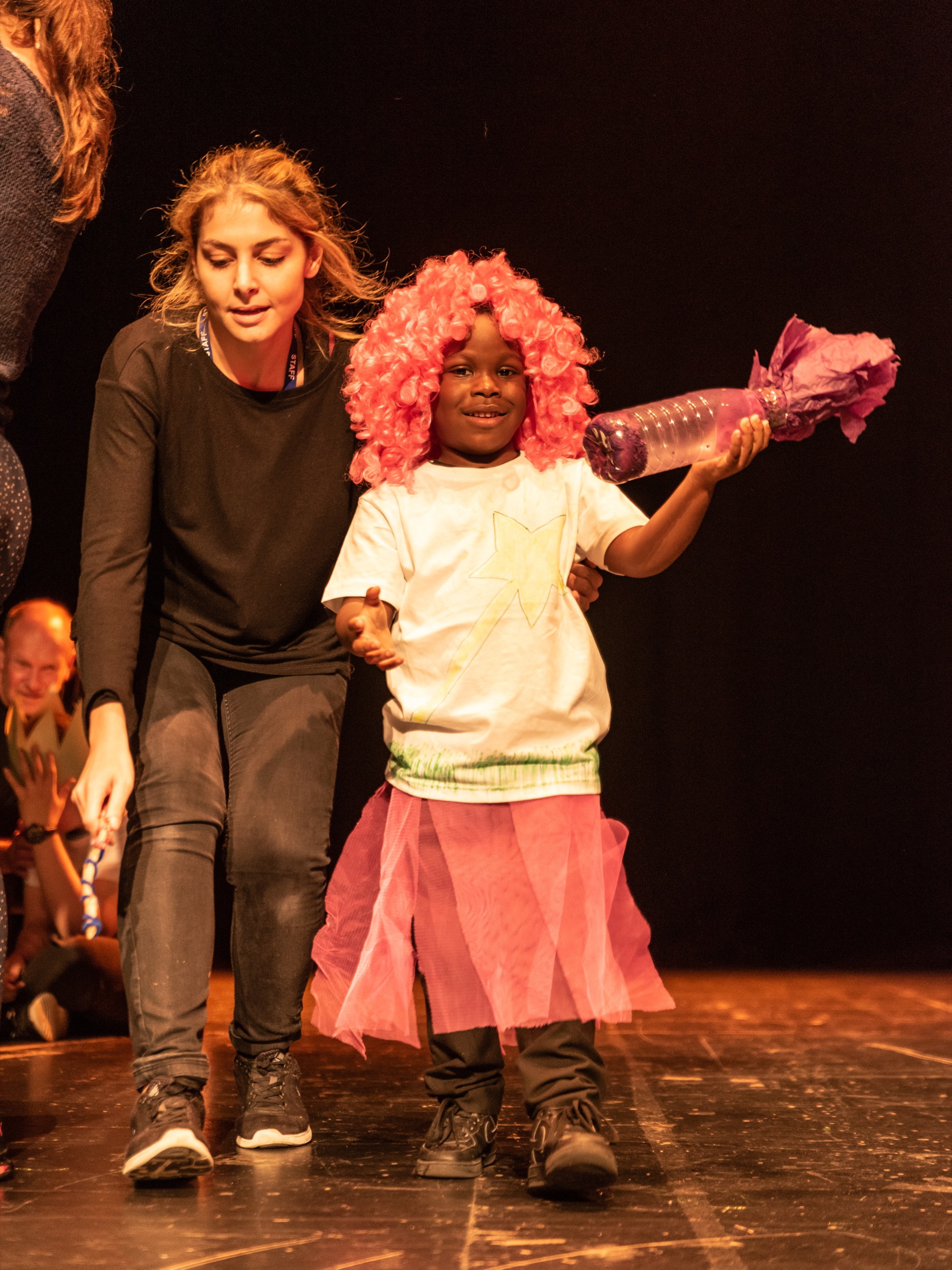What can Shakespeare do for the SEND community?

Throw out everything you once assumed about Shakespeare.
It’s not for me. Nobody understands it. It’s outdated, inaccessible, a pain to teach.
Lauren Brewer, Programmes Coordinator at Coram Shakespeare Schools Foundation, begs to differ. ‘Shakespeare is for everyone. The stage is for everyone. It is a place for inclusion, and a celebration of all’, she says.
The foundation has worked with tens of thousands of children with SEND (special educational needs and disabilities) over the past 20 years, offering workshops that explore Shakespeare like you have never experienced it before. The plays are fully adaptable to accommodate varying levels of need and the foundation works with children from both mainstream and specialist primary and secondary schools across the country.
I sat down with Lauren and her colleague, Louise de Froment, inclusion manager at the foundation, to learn more about their work with SEND children.
Louise recalls a project with Sybil Elgar, a National Autistic Society School, where the children performed a multi-sensory retelling of A Midsummer Night's Dream, focused on movement-based communication, filled with music and props.
‘The children had floating materials, bubbles and crunching leaves to create the environment of the forest. We put on some soft music and let the children react to it, which gradually turned into a game of “Follow the Leader”’.
Their work is child-led and open to what children are keen to explore, according to Louise, who is keen to emphasise the flexibility of the programmes.
‘As teachers and facilitators, we are trying to watch these young people to see what they’re interested in and build on it. It’s about being flexible and responsive, and most of all, it’s about being present.’

From the fringes to centre of the stage
After taking part in Shakespeare Schools Theatre Festival, 98 per cent of teachers reported that their students felt increased levels of confidence and 94 per cent reported that they themselves felt confident teaching Shakespeare to their classes.
‘In a workshop which explored Macbeth, there was a young person who we were told had additional needs and preferred to be at the fringes of action. We were told that they were often quite closed off from their peers,’ says Louise. ‘During the workshop, we had an exercise called ‘flocking’, where you have a group of young people re-enacting a battle by creating a triangle on the stage, one young person at the front, and everyone else mirroring behind them.
‘Suddenly, this young person was right in the heart of the action, at the top of the triangle with his class behind him mirroring his movements. They were absolutely loving it. Watching this, we then encouraged them to take on McDuff’s character so that at the end of the play, they led the army to victory, feeling brilliant and relishing in every moment.’
Teacher confidence is just as important to the foundation. Lauren explains how ‘reimagining practice’ underpins its teacher workshops. She says: ‘the workshops are aimed at allowing teachers to really take Shakespeare and make it as relevant as possible for their young people. We want you to feel free to go and cross things out and write new things.
‘We get such an exciting array of performances. We have some which are very traditional and work really hard on mastering the language but we also have exciting, crazy ways of doing Shakespeare. A setting from last year’s programme decided to do Macbeth entirely through the medium of rap.’
But how do workshop leaders communicate this creative freedom to teachers who are nervous to approach such traditional texts?
Facilitators adopt a school of thought they refer to as ‘The Shakespeare Police’ which is used to encourage teachers to think about their preconceptions of Shakespeare, what they think should and shouldn’t be said, and then challenge these ideas to replace them with new ones that serve them and the children in their classes.
Lauren says: 'We ask our teachers to think about the 'Shakespeare police' or the voices, settings, language and staging they assume are tied to Shakespeare. Then we encourage them to tear this up and reject these assumptions.'
A curtain that is wide open
Putting on someone else’s shoes can be eye-opening. It can help children to transform their perspectives. On stage, this may look like Iago’s jealous rage in Othello, Macbeth’s fatal ambition or Puck’s magical mischief in A Midsummer Night’s Dream. But off stage, real lives are changed by a newly discovered ability empathise with others.
Lauren says: ‘It’s so beautiful to see groups of young people coming together, all from different places, having only met for a few hours over the course of the day and they’re championing each other. You get the younger kids saying, “oh my god, we performed on the same stage as them” when pointing at the older children who they have become starstruck by.’
In one performance, a girl from a mainstream primary school was fixated by the BSL translator of a specialist school for children who are deaf or hard of hearing.
‘They were fascinated by the fact that the other children had spent the whole day talking in this other language and interpreting their production. There was this moment at the end where one of the mainstream schools was performing and the interpreter came forwards to sign the final part of the play. The little girl next to her had been watching her all day and she copied the signs at the end and joined in with the interpretation.
‘It’s so important to give young people that awareness of diversity and build up a predisposition to be both aware and inclusive’.

So what can you expect from Coram Shakespeare Schools Foundation?
‘When working with us, we want to know as much information as possible. Teachers know their students best, and it is our job to listen to them so that necessary adaptions can be made,’ says Louise.
She adds that the foundation will ‘bridge the gap between the school and the theatre as much as possible’ by considering things like:
- Is wheelchair access required?
- Will an interpreter be needed on stage?
- What time of the day is best for the children in your setting? Are there certain times we should avoid when planning performances?
- Is a contained space better for the children?
- Should we avoid using certain sounds to accommodate sensory needs?
- How should we consider the use of lighting?
- Can a social story be provided to reduce anxiety around the experience?
Teachers will then receive a one-day CPD training workshop to get familiar with the plays and drive home the message of flexibility and adaption. Teachers working with children with SEND receive an extra workshop that focuses on inclusion and adaptable provision.
Louise is available throughout the course of the programme to offer advice, help teachers to shape their lessons and respond to any concerns or questions they may have.
A sense of belonging
Speaking to Lauren and Louise, it is clear that achieving a palpable sense of belonging on stage, in the wings, among the audience and beyond is at the heart of Coram Shakespeare Schools Foundation. It is as though stages are crafted with a commitment to holding space for anyone who wishes to take part.
‘I find the work we do so inspiring and energising. There is something so magical about taking the thing that is perceived to be really hard, opening it up and making it accessible so that it becomes the thing that is really special’, Lauren says.
Doing Shakespeare - forwards, backwards or inside out - has so much to offer the SEND community. It may be exactly what we need to celebrate the unique skills and spirit of all children.
------
Find out more about Coram Shakespeare Schools Foundation here.





Please sign in or register for FREE
If you are a registered user on SEND Network, please sign in